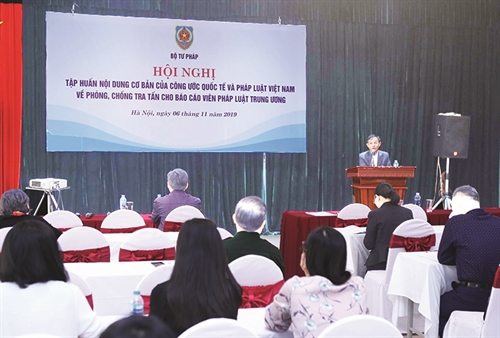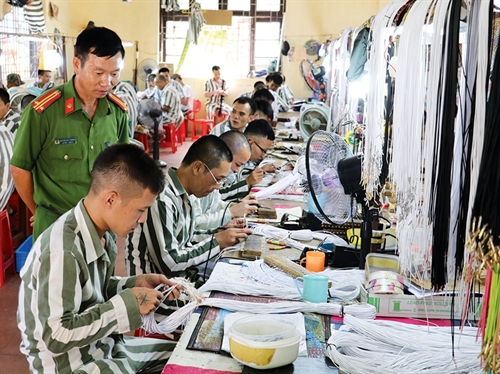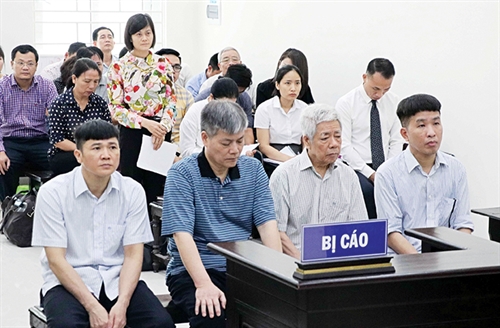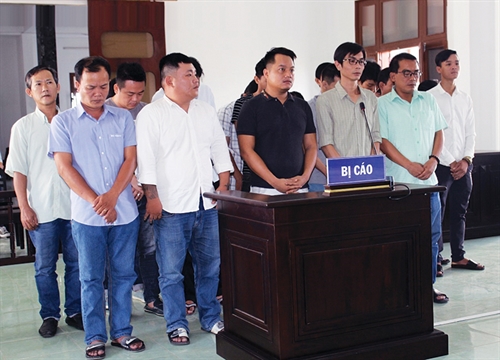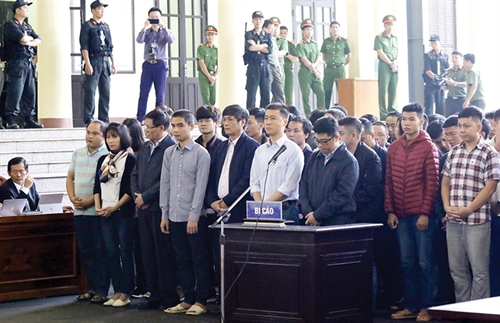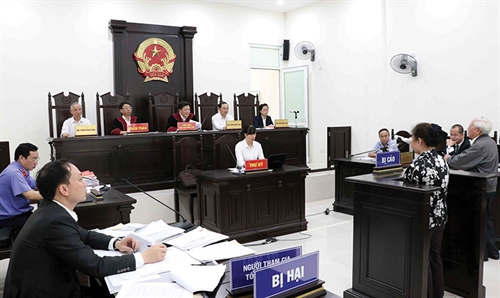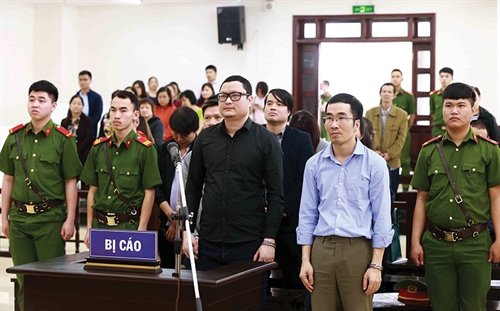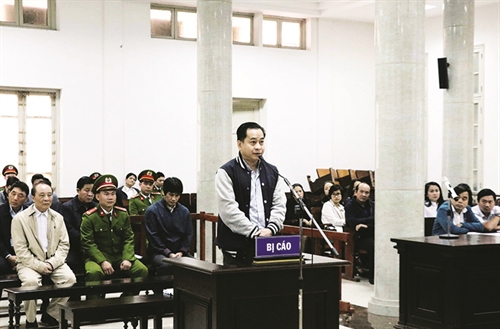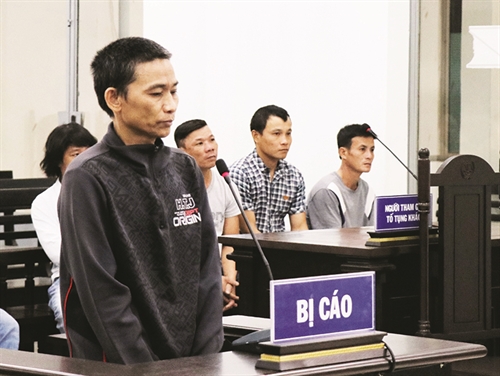Nguyen Cong Long
Justice Department
Office of the National Assembly
On April 8, 2020, the Government issued Decree 44/2020/ND-CP (Decree 44), prescribing enforcement of judgments against commercial legal persons in a move to detail the 2019 Law on Execution of Criminal Judgments. With this Decree, set to take effect from July, the legal framework for execution of criminal judgments against commercial legal persons has been fundamentally completed, guaranteeing the enforcement of the 2015 Penal Code’s provisions concerning criminal handling of commercial legal persons.
Legal framework on execution of criminal judgments against commercial legal persons
Under Article 33 of the 2015 Penal Code, a convicted commercial legal person may face three principal penalties: fine, suspension from operation and termination of operation. It may also be subject to additional penalties like prohibition from doing business or operating in certain areas; prohibition from raising capital; and fine, if not imposed as a principal one.
In addition, the following five judicial measures may be applied to a commercial legal person: confiscation of objects and money directly related to its crime; return of property, redress of or compensation for damage; forcible public apology; restoration to the original state; and some measures to remediate and prevent further consequences.
Under current regulations, the execution of penalties and judicial measures against commercial legal persons may be carried out in two separate ways:
(i) Execution of civil judgments: Before the Penal Code is added with provisions on penal liability of commercial legal persons, the 2014 Law on Execution of Civil Judgments already prescribes the penalties of fine, confiscation of property and collection of illicitly earned money and property, handling of material evidences, property and court fees for trial of criminal cases to be executed by civil judgment execution offices according to the procedures for execution of civil judgments[1]. These penalties are applicable to both individuals and commercial legal persons. As a result, in theory as soon as the 2015 Penal Code and Criminal Procedure Code took effect (January 1, 2018), fine and the judicial measure of confiscation of objects and money directly related to criminal acts may be immediately executed against convicted commercial legal persons.
As provided in Chapter IV of the Law on Execution of Civil Judgments and Government Decree 62/2015/ND-CP dated July 18, 2015, the judgment execution may be carried out at two levels. At the first level, civil judgment execution offices may use measures to secure judgment execution, such as freezing bank accounts, seizing property and papers and suspending the registration, transfer or change of the current state of property[2], all of which aim to prevent dispersal or destruction of property or shirking of judgment execution. At the second level, these offices may apply coercive measures against commercial legal persons, including deduction of money on their bank accounts; collection and handling of their money amounts and valuable papers; subtraction of their incomes; distraint and handling of their property, including also those held by third parties; exploitation of their property; forcible transfer of objects, property rights and papers; and forcible performance or non-performance of certain jobs[3]. The enforcement of judgments will be carried out if obligated commercial legal persons have sufficient conditions but fail to execute judgments within 10 days after receiving judgment execution decisions.
However, there arises a problem in the application of the Law on Execution of Civil Judgments to the enforcement of criminal judgments as it does not embrace all judicial measures provided in the Penal Code. As such, it does not identify those offices responsible for executing the judicial measures specified in Articles 47 and 48 of the Penal Code, such as return of appropriated property to its lawful owner or manager, redress of or compensation for material damage or payment of material compensations and making of public apologies to victims. To address this problem without having to revise the Law on Execution of Civil Judgments, the National Assembly has opted for the solution that provides in Article 158.2 of the Law on Execution of Criminal Judgments[4] the competence of civil judgment execution offices to apply those judicial measures. In other words, the Law on Execution of Criminal Judgments has broadened the scope of regulation of the Law on Execution of Civil Judgments, covering the application of all judicial measures specified in the Penal Code.
(ii) Execution of criminal judgments: A major revision to the Law on Execution of Criminal Judgments is the addition of procedures for execution of judgments against commercial legal persons. As per Chapter XI of this Law, provincial- and military zone-level criminal judgment execution offices are responsible for executing penalties and judicial measures specified in Articles 78 thru 81 and 82.1.b and 82.1.c of the Penal Code. Accordingly, penalties that may be executed under the Law on Execution of Criminal Judgments include: suspension from operation; termination of operation; prohibition from doing business or operating in certain areas; prohibition from raising capital. Two judicial measures: restoration to the original state and implementation of a number of measures to remediate and prevent further consequences, may be also executed under this Law.
Delays in the passage of the revised Law on Execution of Criminal Judgments have actually led to some legal loopholes. Many serious violations have been reportedly committed by enterprises, causing serious public concerns and deserving to be handled as criminal offenses. Due to the delay, violating enterprises would only be subject to fine as the sole enforceable penalty. If the court imposes any other penalties, such as suspension of operation, prohibition from doing business or operating in certain areas, such penalties could not be executed until July 2, 2020. Fortunately, no commercial legal persons have been criminally charged by now.
Besides, the delayed implementation of the 2015 Penal Code is also attributable to the fact that the revised Law on Execution of Criminal Judgments only provides basic procedures for execution of judgments against commercial legal persons, while it assigns the Government to specify coercive measures applicable to commercial legal persons.
Nevertheless, to date the law enforcement agencies finally have adequate legal grounds, including two laws and two guiding texts, for comprehensive and effective enforcement of judgments against commercial legal persons[5].
 |
| A talk on execution of criminal judgments against commercial legal persons held by the NA’s Committee on Judicial Affairs__Photo: https://quochoi.vn |
Basic principles of enforcement of criminal judgments against commercial legal persons
Coercive measures applicable to commercial legal persons include (i) freezing of bank accounts; (ii) distraint of property of value equal to monetary security amounts for enforcement of judicial measures, and (iii) seizure of documents and devices containing electronic data, or seizure or revocation of seals of commercial legal persons[6].
With the aforementioned two mechanisms of judgment execution as well as security and coercive measures, an enterprise may be convicted and face a fine together with additional penalties like prohibition from doing business or operating in certain fields or forcible implementation of measures to remediate or prevent further consequences. In the course of judgment execution, it may concurrently have its property distrained by a civil judgment execution office to secure payment of the fine and its bank account frozen and/or its property distrained by a criminal judgment execution office to secure forcible execution of judicial measures.
So, what are differences between coercive measures to enforce criminal judgments and the execution of the penalty of fine according to civil judgment execution procedures? And why can commercial legal persons still be subject to distraint of property while they are not obliged to pay a fine?
The biggest difference is that if a commercial legal person fails to pay a fine, a property obligation, the civil judgment execution office may distrain its property and put it on auction then remit proceedings (as the fine) into the state budget. Meanwhile, other penalties and judicial measures are to be executed by the commercial legal person itself through its own acts.
The obligation of a convicted commercial legal person to execute a criminal judgment is specified in the Law on Execution of Criminal Judgments[7] as follows:
* If subject to operation suspension, to suspend its operation in one or several of fields under the court’s legally effective judgment or ruling;
* If subject to operation termination, to immediately terminate its operation in one, several or all of fields under the court’s legally effective judgment or ruling;
* If subject to prohibition from doing business or operating in certain fields, to refrain from doing business or operating in prohibited fields within the period stated in the court’s judgment or ruling; to stop doing business or operating as soon as the judgment or ruling becomes legally effective;
* If subject to prohibition from raising capital, to refrain from taking one or several of forms of capital raising within the period stated in the court’s judgment or ruling; to refrain from raising capital as soon as the judgment or ruling becomes legally effective;
* If subject to the judicial measure of forcible restoration to the original state or forcible implementation of measures to remediate or prevent further consequences, to execute the court’s legally effective judgment or ruling.
Noteworthy, the enforcement of judgments against commercial legal persons must adhere to general principles as well as specific principles. As per Article 3 of Decree 44, the principles of application of measures to enforce criminal judgments against commercial legal persons include:
Principle of legality: Enforcement of a judgment may only be carried out when there is a written decision on enforcement issued by a competent criminal judgment execution office. This is the universal and supreme principle for all types of judgment execution. A decision on application of a coercive measure may only be issued when a competent criminal judgment execution office has sufficient grounds to believe that the convicted commercial legal person fails to serve or fully serve the court’s judgment or ruling[8]. The convicted commercial legal person has the right to lodge a complaint about a decision or an act of the office or person competent to execute criminal judgments if having grounds to believe that such decision or act is illegal and infringes upon its lawful rights and interests. Such a complaint may be lodged through its at-law representative[9].
Principle of conformity: Decision on application of coercive measures must be based on penalties and judicial measures to be applied to convicted commercial legal persons, contents, characteristics and level of, and conditions for, execution of enforcement decision and the practical local situation[10]. By this principle, coercive measures may only be applied on a case-by-case basis corresponding to the judgment execution obligation, as follows:
(i) Freezing of bank accounts is applied to enforce the penalty of suspension from operation (in case of suspension from operation in all fields) or prohibition from doing business or operating in certain fields (in case of prohibition from doing business or operating in all fields) or prohibition from raising capital, and to enforce judicial measures[11].
(ii) Distraint of property is applied to enforce the judicial measure of forcible restoration to the original state or implementation of measures to remediate or prevent further consequences[12]. Under the Penal Code, the court may rule to apply the judicial measure of forcible restoration to the original state altered due to criminal acts. Based on specific criminal circumstances, the court may decide to force convicted commercial legal persons to implement one or several measures to remediate or prevent consequences of their crimes. These measures are diverse, from dismantling works or work sections built without permits or at variance with permits; remediating environmental pollution or epidemic spread; taking out of the Vietnamese territory or re-exporting goods, articles or vehicles illegally brought into the Vietnamese territory; to destroying goods or articles harmful to the health of humans, domestic animals or crops and the environment[13]. Since the enforcement of these measures, particularly work dismantlement and environmental remediation, is costly, the distraint and auction of property just aim to generate sums of money needed for the enforcement, but not for depriving of the ownership right of commercial legal persons.
(iii) Seizure of documents and devices containing electronic data and seals of commercial legal persons is applied to enforce the penalty of suspension from operation, prohibition from doing business or operating in certain fields or prohibition from raising capital under legally effective court judgments or rulings. Only documents and devices containing electronic data related to operations of commercial legal persons subject to enforcement[14] which serve as legal tools and technical means essential for their production, business and trading activities, may be seized. This coercive measure proves to be the most effective one to force commercial legal persons that fail to voluntarily execute judgments to stop their violation so as to avoid heavier legal consequences.
(iv) Seizure of seals of commercial legal persons is applied to enforce the penalty of termination of all operations.
It should be noticed that this principle requires judgments enforcers to take into account the practical local conditions and situation since this judgment enforcement measure would greatly affect the production or business operations of convicted commercial legal persons and their employees as well as the local security and order. That’s why competent agencies should exercise caution when applying this measure.
Principle of time limit/validity duration/statute of limitations: The time limit for application of coercive measures to enforce a court’s legally effective judgment or ruling must not exceed that for execution of such judgment or ruling while the time limit for securing implementation of judicial measures lasts until such measures are completely executed[15]. As prescribed in the Penal Code, penalties to be imposed on commercial legal persons are valid for between six months and three years. Theoretically, the enforcement process might last throughout the statute of limitations of penalties, particularly suspension from operation, prohibition from doing business or operating in certain fields, and prohibition from raising capital. Upon expiration of the statute of limitations of a penalty, such penalty will be regarded as having been completely executed. Automatically, any corresponding measure to enforce such penalty will also become invalid.
Principle of combined enforcement: A commercial legal person may be subject to one or more than one coercive measure at a time if the application of a single measure is not enough to ensure judgment execution. This principle ensures strict and effective enforcement of judgments as well as flexible application of measures by criminal judgment execution offices and better protect commercial legal persons executing judgments. For example, if finding a commercial legal person that is coerced by the court to dismantle a work that it illegally built or to remediate environmental pollution financially capable to do so, a judgment execution office may apply the measure of freezing its bank accounts without having to distrain its property. Otherwise, the judgment execution office may apply both coercive measures if the commercial legal person shirks the obligation.
Principle of assurance of lawful rights and interests of related parties: This principle requires enforcers to respect and protect lawful rights and interests of commercial legal persons and related parties for the reason that enforcement always greatly affects employees and communities concerned. Respecting and protecting lawful rights and interests of related parties are expressed in two aspects: (i) application of appropriate measures and organization of reasonable enforcement to ensure proper execution of legally effective judgments and minimize damage caused to employees and business operations of convicted commercial legal persons, and (ii) effective protection of lawful rights and interests of the community, agencies, organizations and the State infringed upon by criminal acts of convicted commercial legal persons and strict enforcement against commercial legal persons when the latter fail to strictly abide by the judgments and cause further damage to other parties.-
